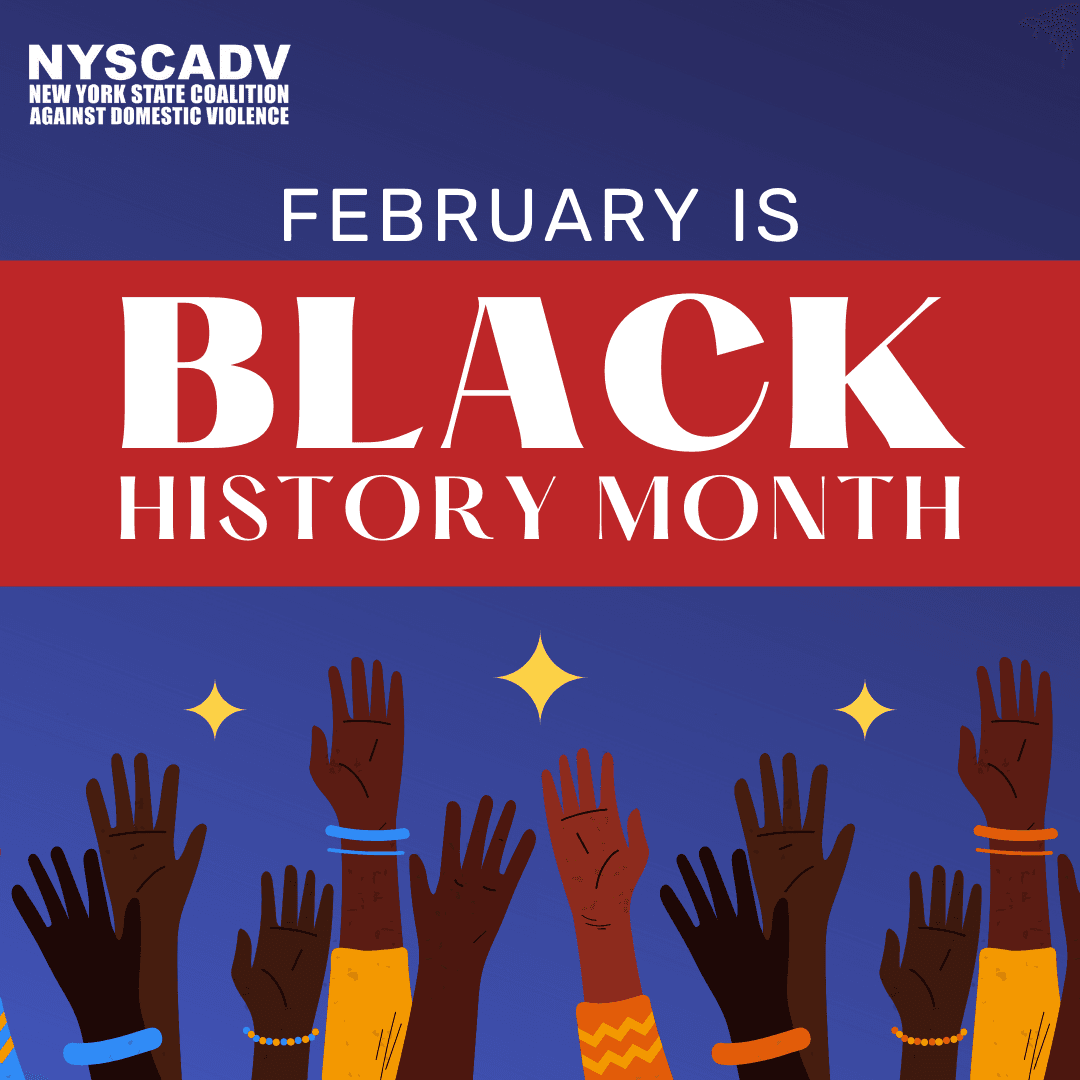
February is Black History Month, an annual event recognizing the pivotal role of African Americans in U.S. history. This year, NYSCADV proudly embraces the diverse and influential history of African American arts and artisans while also acknowledging the pervasiveness of domestic violence and its effects on the community.
African American art, influenced by African, Caribbean, and Black American lived experiences, has significantly shaped visual and performing arts, literature, fashion, folklore, language, film, music, architecture, culinary arts, and more. From the Black Arts movements to the Harlem Renaissance, hip-hop, and Afrofuturism, African American artists have been trailblazers, setting global standards for cultural expression.
However, as we celebrate these artistic achievements, it's crucial to recognize the interconnected challenges faced by Black women, including high rates of intimate partner violence. According to the 2010-2012 National Intimate Partner and Sexual Violence Survey, 45% of Black women experienced contact sexual violence, physical violence, and/or stalking by an intimate partner in their lifetime. The same survey found that 40% of Black men experienced similar forms of violence.
The National Intimate Partner and Sexual Violence Survey also reported that approximately 41% of Black women had experienced physical violence by an intimate partner during their lifetime, compared to 31% of White women, 30% of Hispanic women, and 15% of Asian or Pacific Islander women. Disturbingly, Black and American Indian/Alaska Native women experienced the highest rates of homicide, with over half of all homicides (55%) related to intimate partner violence.
These alarming statistics highlight the urgent need to address domestic violence within the context of the African American community. Unfortunately, Black Indigenous People of Color (BIPOC) survivors face unique barriers and challenges in accessing services and support due to systemic racism and discrimination.
According to the 2015 National Domestic Violence Hotline survey, 2 in 5 participants who called the police reported fearing discrimination based on past experiences, with 22% reporting discrimination due to race. These barriers are even more pronounced for BIPOC survivors who are disabled, immigrants, or LGBTQIA+. The 2015 U.S. Transgender Survey revealed that 61% of respondents who interacted with law enforcement officers suspected they were transgender and experienced mistreatment, including verbal harassment and physical or sexual assault.
In this context, NYSCADV remains committed to elevating the experiences of BIPOC survivors of intimate partner and gender-based violence. We collaborate with BIPOC advocates, allies, and organizations to amplify these voices and work towards a future where all people can live free from violence and oppression.
As we commemorate Black History Month, let's celebrate cultural achievements and recognize the challenges they face. Together, let's spotlight the richness of the past, address present issues, and work towards a future where both art and individuals thrive without the shadow of violence and discrimination.
Resources:
- To learn more about Black History Month and this month's theme, check out the Association for the Study of African American Life and History (ASALH). Dr. Carter G. Woodson, the Father of Black History, founded ASALH. The mission of ASALH is to create and disseminate knowledge about Black History.
- NYSCADV Dismantling Oppression Toolkit. Resources in the Dismantling Oppression Toolkit address the ways we can, and must, engage with our communities and work to acknowledge the interconnectedness of all forms of oppression – racism, sexism, heterosexism, classism, adultism, ableism, etc.
- In Our Own Voices. A New York State-based nonprofit whose mission is to ensure the physical, mental, spiritual, political, cultural and economic survival and growth of the Lesbian, Gay, Bisexual and Transgender people of color communities.
- Organizations dedicated to centering women of color in the movement to end violence:
- Black Women's Blueprint: Founded by survivors for survivors committed to healing and transformation. Their mission is to provide services and spaces for healing, reconciliation, and human connection with the natural world. Working with the land, they bring people together to design and practice strategies for healing, health, and reparative economics.
- Women of Color Network, Inc.: A national grassroots initiative dedicated to building the capacity of women of color advocates capacity to respond to violence against women of color.
- Ujima: The National Center on Violence Against Women in the Black Community: Serves as a national, culturally specific services issue resource center to support and be a voice for the Black Community in response to domestic, sexual, and community violence.


